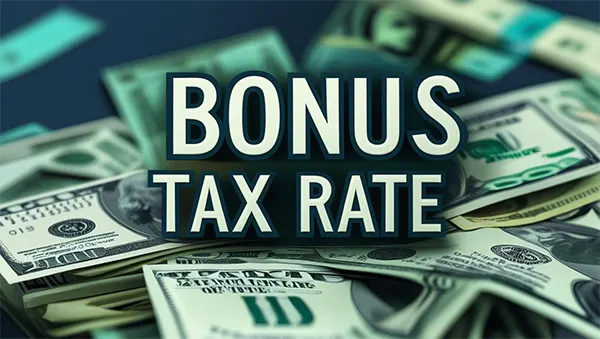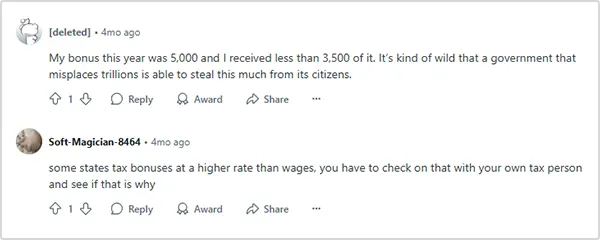What is a Bonus Tax Rate? How Are Bonuses Taxed and Tips to Reduce Bonus Tax Rate
“Your bonus didn’t ghost you—it was just strategically reduced by the IRS.”
Yes, you read it right! The IRS considers bonuses as supplemental wages, and you are bound to pay taxes according to the bonus tax rate. Unlike regular pay taxes, bonuses are taxed differently, which can be quite exhausting.
That’s why I spent several hours acquainting myself with the bonus tax rate to help my readers. I provide detailed information on how bonuses are taxed, how it links to your overall tax liability, why bonuses are taxed at such a high rate, and how to reduce the tax rate.
So, stay tuned to explore essential information on the tax rate on bonuses!
What is a Bonus Tax Rate?

A bonus is an extra reward or compensation that employees receive as an incentive for achieving targeted goals. But employees are legally required to pay taxes on the bonuses at a certain percentage, known as the “bonus tax rate.”
Companies give bonuses on top of workers’ regular salaries in order to motivate them to improve their overall performance. However, the extra payment you earn is subject to income taxes like your regular salary.
According to the Internal Revenue Service (IRS), your bonuses are counted as supplemental wages and may be subject to different withholding taxes or a bonus tax rate. That’s why it is crucial to stay aware of the concepts of tax rate on bonuses and how much are bonuses taxed.
How are Bonuses Taxed?
In the United States, bonuses are generally classified as “supplemental wages.” It means that your extra payments are bonuses taxed differently by the IRS, similar to your regular earned income.
Your employer withdraws a small portion of your bonus paycheck to pay your bonus tax rate. The IRS receives funds on your behalf, and this process is known as tax withholding.
Now, you might be wondering how much are bonuses taxed? Well, the bonus tax rate is divided into two broad categories: the percentage method and the aggregate method. This structure is somewhat similar to how payroll processing works in your company’s compensation cycle.
Therefore, the calculation of your bonus tax rate depends on your employer’s method of withholding taxes. Generally, if your bonus is equal to or less than $1 million per year, your bonus will be subject to a flat 22% federal withholding rate or included in your regular pay.
Also Read: What is Receivables Financing? Why is Accounts Receivable Financing Important for Businesses?
How Does the Bonus Tax Rate Work in 2025?

In 2025, if you receive a bonus as compensation, you are legally bound to pay taxes on it, according to the IRS tax implications. Employees have two options to calculate their withholding taxes. But in general, employers will hold back your taxes before providing your bonuses.
Here are the two major categories of calculating the bonus tax rate.
The Percentage Method
It is the most common and simple method to evaluate your bonus tax rate. The percentage method is applied when you receive a bonus separately from your regular wages payable.
- If your total bonus for a year is equal to or less than $1 million, your compensation is taxed at a 22% flat rate.
- When your total bonus is evaluated at over $1 million, the first $1 million gets taxed at 22% and every dollar over that is legally required to pay a 37% bonus tax rate. This is particularly relevant in states with high exit penalties such as California, where the California exit tax can also factor into broader financial strategy.
Example 1: A “GoodWell Company” gives a $5,000 bonus to its employee for achieving the targeted goals. Now, as an employer, you have to calculate the bonus tax rate using the percentage method.
According to the federal income tax, you should withhold 22% of the bonus to pay taxes.
Let’s begin the calculation: $5,000 (bonus) x 0.22 (22% flat rate)
$1,100 (payment will be sent to the IRS)
Example 2: James receives a $2 million total bonus while working in a high-tech organization. Now, as an employer, you must calculate his bonus tax rate using the percentage method.
According to the tax implications, the first $1 million will be taxed at a 22% rate, and the remaining dollars at 37%.
Calculation: First $1,000,000 (bonus) x 0.22 (22% flat rate)
$220,000
Remaining $1,000,000 (bonus) x 0.37 (37% bonus rate)
$370,000
The total bonus collected by you (as an employer) = $220,000 + $370,000
$590,000
| Pros | Cons |
| It is a relatively simple method to understand and calculate the bonus tax rate. | It may not be an ideal method for those who fall in the higher tax bracket than 22%. |
| It is generally available for all taxpayers. | If the flat percentage doesn’t match the actual tax rate, it results in a tax liability. |
| This method calculates tax withholding on bonuses separately. |
The Aggregate Method
The aggregate method is also known as the wage bracket method. It is often used by employers when they add bonuses to employees’ regular salary paychecks. This method becomes important if your organization follows a semi-monthly pay schedule or combines wages across pay cycles.
- You will receive bonuses and salaries in a single paycheck.
- Your payroll manager will withhold taxes on your aggregated payment, including bonuses and salary, at the same time. The withholding rate is based on your tax bracket and the information you provide in the form W-4.
Example: Smith’s monthly income is $20,000, and he receives a $1,500 bonus in one month. So, calculate his withholding amount according to the aggregate method.
In this case, the employer added Smith’s bonus to his regular salary, so now his monthly salary is $20,000 + $1,500 = $21,500.
Let’s assume that Smith’s filing status falls into the 27% tax bracket.
Calculations: $21,500 (total income) x 0.27 (27% tax rate)
$5,805 (total amount paid as a tax)
| Pros | Cons |
| It is alternatively the best method to cover your tax liability. | This factor could result in bonuses being taxed at a higher rate than necessary. |
| This method gives you a better option of withholding accurate tax and a chance to get a refund. | It calculates your bonuses and salaries together at the same time. |
| It is a more accurate method to evaluate tax rate according to W-4 specific information. |
Also Read: Biweekly Pay: Learn How to Calculate Biweekly Pay, Along with Its Advantages and Challenges
Which Types of Bonuses are Taxed?

In the United States, bonuses are usually considered supplemental wages, according to the IRS. This means they are subject to federal, state, and local income taxes, as well as Medicare and Social Security taxes. Individuals managing variable income types might also look into debt financing or capital structures to manage liquidity.
However, if bonuses are received as fringe benefits, like tickets to an event, they may be non-taxable. Apart from that, some fringe benefits are legally bound to pay taxes based on special withholding rules.
Let’s learn about different types of bonuses that fall under Section 61 and are obligated to pay taxes.
- Performance Bonuses: It is a kind of reward you receive for achieving a targeted goal.
- Holiday Bonuses: Extra payments or gifts employers give to you in appreciation of your work throughout the year.
- Signing Bonuses: Incentives are offered to new employees in case they accept the job offer.
- Retention Bonuses: Extra payments made to encourage team members to stay in the company.
- Profit-sharing Bonuses: The company distributes its profits to its best employees according to their performance.
- Cash Equivalent Bonuses or Cash: Employers offer gift cards, gift certificates, which are easily exchanged for cash.
- Other Supplemental Wages: Payments that are separate from regular salary, such as overtime pay, commissions, awards, prizes, accumulated sick leave, and back pay.
Essentially, it is advisable to consult with a tax professional for personalized advice and to calculate the accurate bonus tax rate. It is helpful to reduce tax liability and increase the chance for tax deductions.
How Do US Residents Respond to Bonuses Taxed So High?
It is a common misconception that bonuses are subject to high taxes in the US. In reality, the tax rate is not high, but the withholding amount is relatively higher. Still, people are dissatisfied with the bonuses that are mandated to be taxed. Some also consider redirecting their bonuses into diversified assets like cryptocurrencies to improve their long-term net returns.
Others, who are renters, might choose to invest a portion of bonuses in backup security like renters insurance, allowing better financial safety.
On Reddit, they are showing their frustration with the government. One user, @Soft-Magician-8464, said, “Some states tax bonuses at a higher rate than wages; you have to check on that with your own tax person and see if that is why.”

But it is important to note that the reason behind “Why are bonuses taxed so high?” is how the IRS handles the bonus tax rate. The percentage and aggregate methods are the major causes of high bonus tax.
Moreover, bonuses are irregular or one-time wages that are added to your total income and push you into a higher tax bracket. To avoid underpayment of taxes, the IRS requires a higher withholding rate on supplemental wages.
On the brighter side, if too much of the bonus is paid to the IRS, you will receive a refund when you file your tax return.
Hence, you should be aware of the modifications in bonus tax rate rules and regulations and consult your employer about how are bonuses taxed.
Also Read: UK Tax Year: A Branded Guide to Stay Compliant with Tax Regulations
What are the Strategies to Reduce the Bonus Tax Rate?
Your employer is solely responsible for calculating your bonus tax rate and withholding amount. Although you can’t avoid taxes in the US, you can reduce them.
Yes! There are several methods or strategies you can use to minimize your bonus tax rate. So, take a look!
Review Your W-4 Form
You can receive bonuses at any time period throughout the year. So, it potentially boosts your income and puts you under a higher tax bracket. As a result, it can increase your tax liability.
Therefore, it is a wise decision to maintain or edit your W-4 form to adjust your withholdings. But if you find the process tricky or complex, you can use the IRS Tax Withholding Estimator tool to avoid a high tax bill.
Check Your Bonus is Actually Taxable and Use it Wisely
Make sure your bonus is actually taxable or not. According to the IRS, certain bonuses like tickets for events, money for meals, holiday gifts, flowers, books, etc., are nontaxable. On the other hand, cash, gift cards, and high-value gifts are legally bound to pay taxes.
Furthermore, if you use your bonus wisely, you can easily minimize your tax implications. You must contribute to a 401(k), IRA, or Health Savings Account (HSA) to unlock the tax deduction facility when filing a tax return. Alternatively, you can reduce cash liability by applying budgeting strategies like those suggested in GoMyFinance’s saving guide.
Take Advantage of Tax Deductions
Tax deductions are one of the best-known methods to reduce tax liability. If you showcase your expenses, such as unreimbursed medical costs, donations, and mortgage interests, they can be added to the standard deduction and help you reduce your taxable income. This way, taking advantage of tax deductions can save your tax bill.
Defer Your Bonus
You can request your employer to defer your bonus until the following year. By practicing this strategy, you can postpone your tax liability for the next year (you can’t eliminate the tax owed). It can be beneficial in two situations:
- If you want to save some money in the current year, you can defer your bonus to reduce your taxable income and bonus tax rate. It will automatically shift to the next taxable year.
- You can also request deferred payment in case you think your next year’s income will be low, and minimize your tax bracket. So, the added bonus can’t affect your withholding amount.
Overall, if you practice these aforementioned tips or strategies, you can surely save some amount of bonus. These methods can be proven beneficial for every taxpayer in the US.
Also Read: What is Additional Paid in Capital? — Its Definition, Calculation, and Importance
The Bottom Line!
To sum up, bonuses are considered supplemental wages according to the IRS. That’s why they are taxable as regular income. It is important to note that “how are bonuses taxed” can be calculated by the percentage and aggregate method.
However, it is totally dependent on how are bonuses taxed differently by the employers. In order to reduce your withholding amount, you should review your W-4 form, apply for tax deductions, and request deferred payments.
On top of that, if you find it hard to evaluate the bonus tax rate, you should consult a tax professional for personal guidance. You might also explore how broader OASDI taxes interact with your bonus payouts in paycheck calculations.
And if you’re someone intrigued by the future of AI and finance, bonus incentives in firms like Life2Vec crypto could soon be part of performance-linked rewards.
Frequently Asked Questions
Ans: According to the IRS, the bonus tax rate could be 22% flat on the first $1 million and more dollars taxed at 37%. Additionally, bonuses are subject to Social Security tax (6.2%) and Medicare tax (1.45%). That’s why the total percentage could reach 40%.
Ans: The Percentage Method: $50,000 x 0.22 (22% flat rate)
$11,000 (taxed amount)
The Aggregate Method: If your employer uses this method, your bonus is added to your regular salary. So, you have to pay according to your tax bracket.
Ans: You receive a $7,800 bonus after deducting a 22% flat tax rate from $10K.
Ans: Generally, a large bonus exceeds 10-15% of base salary and is sometimes expected to exceed 30%.
Ans: On Reddit, people often discuss a high bonus tax rate with each other and gain a sort of essential knowledge.
Sources: